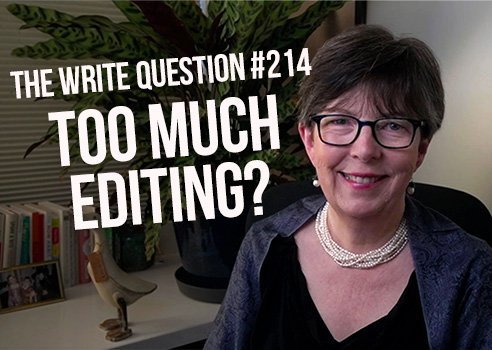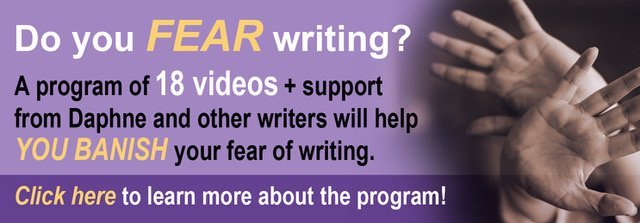Viewing time: 4 mins 46 secs
The Write Question is a weekly video podcast all about writing. Today’s question? How much is too much editing? If you have a question you’d like me to answer you can email me, tweet me @pubcoach, or leave a message for me at the Skype account, The Write Question.
Transcript:
How much is too much editing? That’s the topic I’m addressing today in The Write Question. I’m Daphne Gray-Grant, the Publication Coach.
I have a question from Gary Fishman, a writer based in New York City. Here’s what he’s asked by email…
“I’m a big fan of your lousy first draft approach, but I sometimes find myself editing and rewriting, endlessly – or at least a long time – until nothing else strikes me as meaningful to change, or I’m changing the same things back and forth. I guess my question is, what should a good writer do? But then I hear others say perfection is the enemy of good, and one’s 80% is probably viewed as 100% by most readers. What do you think?”
Thanks for your question Gary. What you’re describing is the frustrating sense of uncertainty that ALL writers face, even professional ones. We all ask ourselves, ‘Is what I’ve written any good? In fact, is it even adequate?’
This uncertainty is why all writers require editors and should WELCOME feedback from other, more neutral pairs of eyes.
But of course, before you get that feedback, you’ll want to do some significant editing yourself. Let me give you three suggestions that I hope you find helpful.
First, you should always take a substantial break between finishing writing a piece and starting to edit it. For long-form projects like books, dissertations or major reports, I recommend six weeks, no peeking.
I call this ‘incubation time’ and I think it’s one of the best things you can do for yourself as a writer. This break or pause will help give you the perspective you need to be a much more effective self-editor. I’ve written a blog post on the topic and I encourage you to take a look at it in the show notes below.
But if you’re facing a tight deadline and just don’t have the luxury of six weeks, take as long a break as you possibly can — at least a full day. And if you don’t even have a full day, then make sure you do something highly distracting after finishing writing but before picking up your red pen. Getting the piece of writing out of your mind is terribly important.
Second, you should allow a LOT of time for editing. Editing is the single most important step of the writing process – far more important than the writing itself. If you want a rough guideline, understand that editing should take at least twice as long as the writing does. Yes, that’s a lot of time!
Third, use software to help yourself. I really like the program ProWritingAid. It’s much more effective than Grammarly and it’s less expensive, too. You can be very organized with ProWritingAid and go through your writing in a systematic way. Be sure to look at useful markers like:
- Average sentence length (your average should be between 14 and 18 words)
- Volume of passive voice (should be low)
- Number of transitions you’ve used (should be high)
In the show-notes below I provide a link to a blog post offering a complete self-editing checklist. Have a look. And if you want to learn more about ProWritingAid, I provide the link to my blog post about that as well.
Finally, let me wrap up with the words of the American film editor Thelma Schoonmaker: “Editing is a lot about patience and discipline and just banging away at something, turning off the machine and going home at night because you’re frustrated and depressed, and then coming back in the morning to try again.”
Gary, I know editing can seem tiresome and frustrating. Get your writing to the best state it can possibly be, THEN, give it to someone else — either a professional editor or a skillful friend. Hearing from a neutral third party should help you feel much more secure about the quality of your writing.
*
Viewers, if you have any writing-related questions, I’d be happy to do a video on them. Just send me a quick email, daphne@publicationcoach.com, or put a note in the comments section of this video.
And, if you’d like to learn more about how to make your writing a faster, more rewarding process, check out my latest book Your Happy First Draft. I don’t sell it in bookstores or via Amazon. The only place to buy it is on my website, link on the screen below and in the show notes.
Links
How to become a better writer by incubating
A complete self-editing checklist


